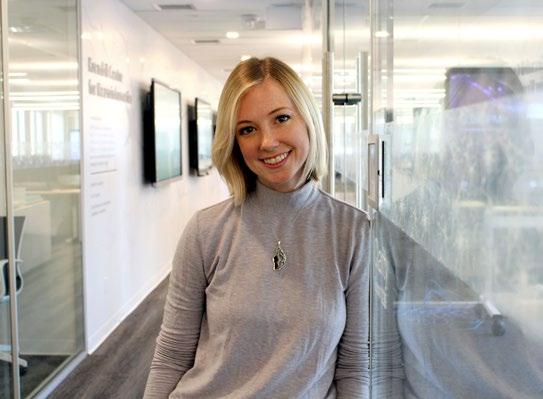
4 minute read
Student Spotlight
by IMS Magazine
We are living in a time when we are so pre-occupied with checking phone notifications that we forget to pause and enjoy the moment. From this perspective, practicing mindfulness can be a breath of fresh air. This is how PhD candidate Laura Best chooses to live her life. By Natalie Simonian
Laura Best is an excellent example for enjoying the journey not the destination, seizing emerging opportunities, and helping others where she can. She began her career in research conducting her undergraduate thesis in the lab of Dr. Paul Clarke. It was in Dr. Clarke’s lab where she became interested in translational science which involves using lay language to make science accessible to all. Laura continued her journey into academia at the Institute of Medical Sciences (IMS) where she conducted her masters which transformed into her current PhD project in the lab of Dr. Isabelle Boileau at the Centre for Addiction and Mental Health (CAMH). Her PhD thesis focuses on the involvement of the endogenous cannabinoid system in both the risk of developing Alcohol Use Disorder, and the response to treatment. In the study, Laura runs a neuroimaging clinical trial conducting Positron Emission Tomography (PET) scans of patients at early abstinence from alcohol. The treatment varies per individual, and the study runs concurrently with the participants treatment. While conducting her PhD Laura was also involved in the IMS Student Association (IMSSA) as 2018/2019 Co-President and 2017/2018 Director of Community Outreach. She has also been student lead of the IMS annual events titled “U of T Talks” and the 2019 Ori Rostein Lecture.
Advertisement
Laura’s daily life involves balancing her research with her extracurricular commitments. While the life of a PhD student can be stressful, Laura says her “key to success” is mindful living. As a certified yoga instructor, much of Laura’s methods of stress management come from yoga, meditation, and mindfulness. The exercises Laura teaches during yoga classes encourage one to take a breath and enjoy the present moment. This can involve practices such as getting off the subway one stop early to take a walk to work, or scheduling time with friends to have a coffee break in between lab meetings.
As an advocate of mindful living, Laura believes it is important to have a positive outlook on life. Laura mentions that sometimes research may not pan out as expected but instead of focusing on the potential downsides of research, she decides to be optimistic and uses obstacles as motivation to succeed. In her research career Laura attended conferences, received presentation awards, as well as the Canada Graduate Studies CIHR Doctoral Award. She is thankful for all her opportunities but maintains that she would not be where she is if she didn’t prioritize her physical as well as her mental health. Laura states the importance of living in the moment and de-stressing after a particularly busy day. De-stressing can range from hanging
out with friends, getting involved with extracurricular activities, or exercise. For Laura, opportunities to de-stress involve spending time with loved ones and her rescue dog named Riley.
Laura’s mindfulness practices also inform her research. As Laura works with a vulnerable population, a special set of skills are required to be able to conduct research while respecting individual autonomy. While Laura did receive training to work with vulnerable patients, she explains that when conducting her research, she takes a step back and assesses how the information she wants to convey will be received by each person. “You have to be aware and mindful of how you are coming across and respect each individual” Laura says. When I asked Laura what her plans were post-graduate school, she told me that she was open to multiple possibilities. She knows that she wants to apply to a clinical program (medical school, nursing school, or occupational therapy) to eventually become a clinician-scientist; melding her love of interacting with people and her desire to understand human motivations behind behavior. However, she maintains that wants to be open-minded about her future.
For Laura, graduate school has been some of the most memorable years of her life and she is proud of who she has grown to become in this program. Being involved with IMSSA has allowed her to connect with and form strong relationships in the IMS grad community, helping and receiving help from other students along the way. Laura left me with these words for present/future IMS students “Remember to breathe. You will get it all done, and you will enjoy the journey.” She mentions that she initially entered graduate school with the mentality that work/extracurricular activities were a checklist of things she “should” be doing. Laura now exits graduate school with a new mentality centered on enjoying the journey, not rushing to get to the destination, and remembering that humans thrive in community and are stronger together.

Photo by Mikaeel Valli
LAURA BEST










